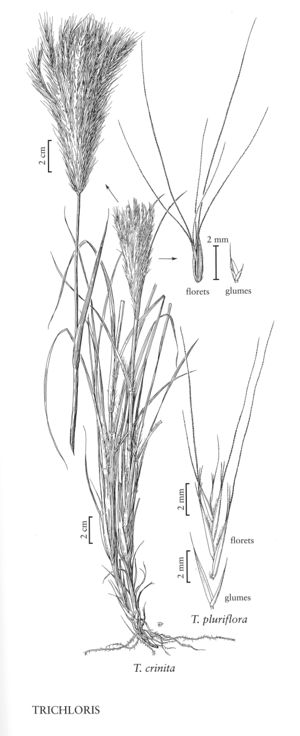Trichloris crinita
Plants perennial; cespitose, sometimes stoloniferous. Culms to 100 cm. Sheaths glabrous or sparsely hirsute; ligules to 3 mm; blades to 20 cm long, 5-10 mm wide, scabrous. Panicles with 6-20 branches in several closely-spaced whorls, appearing as a single terminal cluster; branches to 15 cm, erect, with 7-9 spikelets per cm. Spikelets with 1 bisexual and 1(2) sterile floret(s). Lower glumes 0.8-1.1 mm; upper glumes 2-2.5 mm, awned, awns to 2 mm; lowest lemmas 2.4-3.8 mm long, about 0.5 mm wide, dorsally compressed, narrowly lanceolate to elliptic, scabrous, particularly distally, apices bilobed and 3-awned, central awns 8-12 mm, equaling or slightly longer than the 5-12 mm lateral awns; first sterile florets 1-1.5 mm, narrowing to 3 subequal 5-7 mm awns; second sterile florets, if present, similar but smaller. Caryopses 1.7-2.3 mm, strongly dorsally flattened. 2n = 40.
Distribution
N.Y., Ariz., N.Mex., Tex.
Discussion
Trichloris crinita is a native species that grows in the southwestern United States and northern Mexico, and, as a disjunct, in northern Argentina.
Selected References
None.
